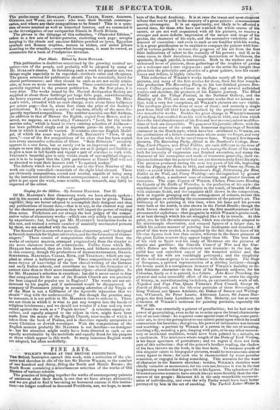Part Music. Edited by Jon HULLAR.
This publication is doubtless occasioned by the growing musical ac- quirements of the people, and probably will be adopted by many of Mr. HULLAH'S classes. In furnishing such a work for popular use, two things ought especially to be regarded—intrinsic value and cheapness. The pieces selected for publication should also be essentially fitted for choral performance ; and they should be such as are not easily attain- able, at least on more reasonable terms. These considerations are but partially regarded in the present publication. In the first place, it is very dear. The works issued by the Musical Antiquarian Society are supplied at about three farthings per large folio page, notwithstanding the heavy expense of purchasing and scoring rare editions. Mr. Hut: Low's work, attended with no such charge, costs about three halfpence per octavo page—that is, about four times the price of the Society's publications. It is merely a series of reprints, chiefly of the most fre- quently reprinted compositions. The number contains one full Anthem, (in addition to that of HENRY the Eighth, copied from BOYCE, and in- serted, we suppose, as a curiosity,) Fatty...tees " Lord, for thy tender mercies sake," which is found in every existing selection of Anthems— has been published singly and in separate parts—in short, in every form in which it could be wanted. It contains also one English Madri- gal, of which the same may be affirmed, BENNETT'S " Flow, 0 my tears,"--one of the few compositions of its class that has been copied into every successive collection of Glees. "Rule Britannia" certainly appears in a new form, but as surely not in an improved one. All at- tempts to turn this noble song into a glee are as il,-yudged and foolish as to give a man in full health and vigour a pair of crutches to walk with. STEVENS'S beautiful glee is only within reach of accomplished singers, and it is to be hoped that the 1,500 performers at Exeter Hall will not be directed to treat their hearers with " Ye spotted snakes."
The defects which we have pointed out in the First Number of this work are easily remedied—materials of the right kind abound. These are obviously compositions, sacred and secular, capable of being sung by the instructed multitude without accompaniment ; and as so high a price is put upon the work, some trouble, some research, may fairly be expected of the editor.


























 Previous page
Previous page